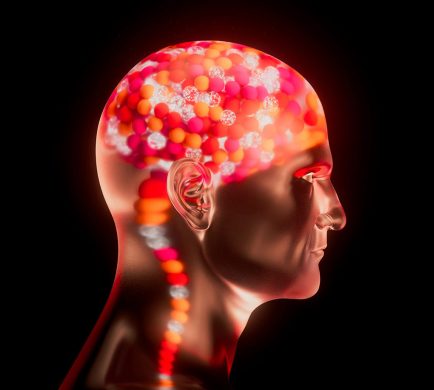Psychophysiologic disorders are at the root of chronic conditions plaguing millions of Americans.
One in five adults in the U.S. suffers from chronic pain or illness that is “medically unexplained,” and many of these symptoms are tied to stress-induced changes in the brain, new research reveals.
An estimated 50 million Americans suffer from pain or illness not caused by injury or disease. These Psychophysiologic Disorders (PPD) are generated by changes in nerve circuits in the brain and include fibromyalgia, irritable bowel syndrome, migraine, many cases of chronic fatigue syndrome, some cases of long-term COVID-19, and many other painful conditions. But new research confirms that pain relief psychology achieves far better outcomes for non-structural pain or illness than earlier forms of treatment, Dr. Clarke says.
Dr. Clarke explains how Adverse Childhood Experiences (ACEs) can lead to chronic pain and illness later in life, and how you can screen yourself for the possibility of PPD contributing to your symptoms.
An estimated 50 million Americans suffer from “medically unexplained” pain or illness — conditions that are not caused by injury or disease. They include people struggling with chronic pain, migraine, fibromyalgia, irritable bowel syndrome, chronic fatigue, pelvic pain, and many other conditions.
Many people, and even many medical professionals, don’t realize that these conditions can be caused or aggravated by unrecognized stress, trauma, or emotions. This is the largest blind spot in health care, and it’s a long time before we address it.
One in five adults and 40% of patients who consult a primary care physician suffer from chronic pain or illness without a clear physical cause. These psychophysiologic disorders (PPD) are tied to stress-induced changes in the brain, new research shows.
Patients with these disorders are often told, directly or indirectly, that their symptoms are “all in your head,” which implies they are neurotic with symptoms that are not real. The truth is that the research shows that symptoms of psychophysiologic disorders are just as real as those of any other form of illness.
This is because studies of the brain show significant symptoms associated with changes in nerve pathways. These changes affect how the brain processes signals coming from the body. The changes are linked to stress that often includes the long-term impact of Adverse Childhood Experiences.
To help people discover if their chronic pain or illness is the result of a psychophysiologic disorder, we developed a self-assessment questionnaire https://ppdassociation.org/ppd-self-questionnairewhich includes the questions below. When taking the quiz, keep in mind the questions are only a screening tool and cannot provide a diagnosis. Please discuss any concerns about your specific condition with a medical or mental health professional.
5 signs that PPD may be an underlying cause of your pain or illness:
- When you first consult your doctor about a chronic pain or illness, there is a 40% chance that a psychophysiologic disorder is responsible. After the doctor has completed diagnostic testing and has not found a disease or injury to explain the symptoms, the probability that a psychophysiologic disorder is responsible is very high.
- You have more than one symptom that has persisted for longer than six months. The more symptoms you have and the longer you have had them, the more likely PPD is responsible. (Note that many people with PPD have just one symptom.)
- Your symptoms are located in different parts of the body or change locations. The more different places you have symptoms, the more likely PPD is contributing. Symptoms that change their location are usually linked to PPD.
- Your symptoms get worse when you are under stress or think about stressful situations. When this is the case, PPD is likely contributing to your condition.
- If you learned that a child you care about was experiencing everything you did as a child, you would feel sad or angry. This is a sign that adverse childhood experiences (ACEs) could be a cause or aggravating factor.
Adverse childhood experiences can be traumatic and obvious or subtle and difficult to recall. Many of the patients I have treated became ill years or even decades after they had grown and moved away from their families. In these cases, their illness is the result of the long-term consequences of childhood stress, a process often hidden from those experiencing it. Learning this truth had a profound effect on the trajectory of my medical career.
Near the end of my medical training, I met a patient I had no idea how to treat. She was 37 years old and suffering from severe abdominal symptoms, but an extensive diagnostic evaluation found nothing wrong. The chairman of my department and I reluctantly concluded we had nothing more to offer, and it was left to me to share this bad news.
During that conversation, I asked the patient about stress in her life. She told me, in a calm voice, that her father had sexually abused her hundreds of times from age four to twelve. I had no training in how to respond to that, but I had heard of a psychiatrist at my institution who did.
I didn’t believe at the time that the psychiatrist, Harriet Kaplan, MD, could do more than help the patient live with her abdominal condition. When Dr. Kaplan cured the patient with a few months of psychotherapy, I was amazed and humbled. She introduced me to the concepts I call Pain Relief Psychology (PRP). Since 1984, as a gastroenterologist in private practice, I have used PRP to help thousands of patients.
Our understanding of psychophysiologic disorders and effective treatments for them has come a long way. Recent studies in Halifax, Boston, Detroit, Colorado, and Los Angeles have shown that several closely related versions of Pain Relief Psychology provide dramatically better pain relief than traditional forms of treatment such as mindfulness, injections, and cognitive behavioral therapy.
Bridging psychology and physiology, Pain Relief Psychology begins with education that pain or illness can be generated by the brain, thereby reducing patients’ fear of damage to their bodies. Shifting attention to how stress might be affecting the brain begins the process of uncovering stresses, unrecognized emotions, or triggers. Symptoms improve when these are addressed, sometimes dramatically.
The Psychophysiologic Disorders Association is a 501(c)(3) nonprofit dedicated to ending the chronic pain epidemic by promoting awareness of PPD diagnosis and treatment. We support an evidence-based, biopsychosocial approach that is safer, more affordable, and more effective than traditional methods in treating chronic pain. Numerous PPD training programs, webinars, textbooks, self-help books, and even apps are now available to educate professionals and treat patients. This approach has extraordinary benefits for patients and healthcare professionals, as well as reducing healthcare costs and the ravages of the opioid epidemic. The more people — both medical professionals and members of the public — who know about psychophysiologic disorders and what causes them, the more these patients will receive the care they deserve.







